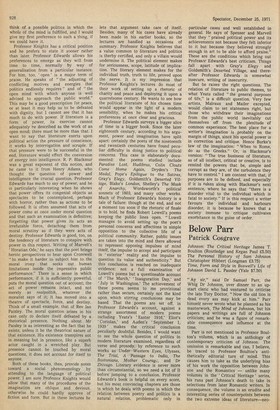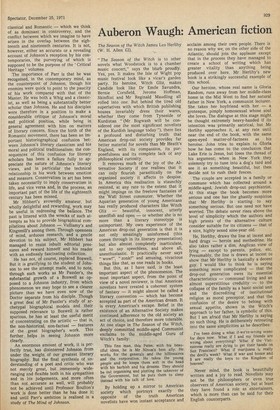Below Parr
Patrick Cosgrave
Johnson: The Critical Heritage James T. Boulton (Routledge and Kegan Paul £5.50) The Personal History of Sam Johnson Christopher Hibbert (Longman £3.75) Time, Form and Style in Boswell's Life of Johnson David L. Passler (Yale $7.50)
"Ay sir," said Dr Samuel Parr, the Whig Dr Johnson, over dinner to an upstart cleric who had ventured to criticise the late Tory Doctor, "Now the old lion is dead every ass may kick at him." Parr himself never wrote what he planned as his masterwork, The Mind of Johnson, but his papers and writings are full of Johnson criticism; and he was a figure of remarkable consequence and influence at the time.
Parr is not mentioned in Professor Boulton's volume, Which is an anthology of contemporary criticism of Johnson. The omission is remarkable and can, I believe, be traced to Professor Boulton's antithetically editorial turn of mind. This causes him to take as the underlying bias of his work the opposition between Johnson and the Romantics — unlike many volumes in the ' Critical Heritage ' series, his runs past Johnson's death to take in selections from later Romantic writers. In consequence, the volume is an erudite and interesting series of counterpoints between the two extreme ideas of literature—neo classical and Romantic — which we think of as dominant in controversy, and the conflict between which we imagine to have arisen in the overlap between the eighteenth and nineteenth centuries. It is not, however, either an accurate or a revealing account of Johnson's reception by his contemporaries, the purveying of which is supposed to be the purpose of the Critical Heritage' volumes.
The importance of Parr is that he was recognised, in the contemporary mind, as the counterpoint of Johnson, though his enemies were quick to point to the paucity of his work compared with that of the Master. He was both a Whig and a classicist, as well as being a substantially better scholar than Johnson. He and his disciples were therefore in a position to make a considerable critique of Johnson's moral and political position, while being in general agreement with him on matters of literary concern. Since the birth of the Romantic movement, there has been an important historiographical confusion between Johnson's literary classicism and his moral and political traditionalism: the consequences of this confusion for literary scholars has been a failure fully to appreciate the nature of Johnson's literary views, and in particular the technical relationship in his work between emotion and measure. Conservatism in art has been taken necessarily to imply conservatism in life, and vice versa and, in the process, an important part of the life of the eighteenth century has been missed.
Mr Hibbert's avowedly amateur, but wholly delightful and rewarding, work may be useful in redressing the balance. The past is littered with the wrecks of such attempts as his to provide biographical compilations about Johnson — Vulliamy's and Kingsmill's among them. Through openness of mind, arduous research, and a gentle devotion to his subject, Mr Hibbert has managed to resist inbuilt editorial pressures and reward himself and his reader with an endlessly fascinating collection.
He has not, of course, replaced Boswell. But it is gratifying to the student of Johnson to see the attempt made, and to note, through such works as Mr Passler's, the substantial growth of a Boswell as opposed to a Johnson industry, from which phenomenon we may hope to see a clearer picture than we have even now of the Doctor separate from his disciple. Though a great deal of Mr Passler's study of archetypal biographical models and their supposed relevance to Boswell is rather spurious, he has at least the useful merit of concentrating on the artistic — that is, the non-historical, non-factual — features of the great biographer's work. This further helps in seeing Johnson more clearly.
An enormous amount of work, it is perfectly true, has disinterred Johnson from under the weight of our greatest literary biography. But the final synthesis of understanding of a poet and critic who was not merely great, but immensely wideranging and flexible both in his sympathies and in his judgements, and more often than not accurate as well, will probably not be achieved until Professor Boulton's work is done better than he has done it; and until Parr's ambition is realised in a study of The Mind of Johnson.











































 Previous page
Previous page